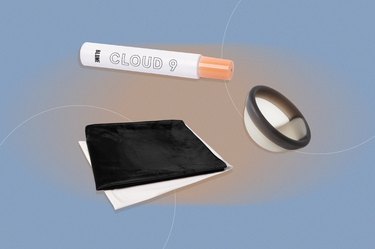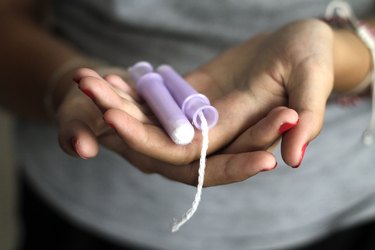
There's no shortage of vaginal hygiene sprays, douches, wipes, soaps and cleansers that claim to balance pH levels and make your vagina smell like something other than, well, a vagina. But if you're wondering how to wash your vagina safely, your best bet is to skip these products altogether.
In fact, many of these products are unnecessary — if not downright harmful — for your vaginal health.
Video of the Day
Video of the Day
For example, vaginal deodorants, sprays and powders can contain questionable chemicals and fragrance that promise to make your vagina smell like "fresh lavender" or "citrus breeze." These ingredients can cause problems like contact dermatitis of the vulva, which happens when the skin of the vulva becomes irritated, according to the University of Iowa Hospitals and Clinics.
In short, ditch the products. Instead, here's how to wash your vagina and vulva the safe and healthy way.
Tip
It's totally normal for your vagina to have an odor, as long as there are no other vaginal symptoms like abnormal discharge, per the Mayo Clinic.
How to Wash Your Vagina and Vulva
When we talk about how to wash your vagina, what we're really talking about is washing the vulva. The vulva is everything that makes up the outer part of the vagina (including the clitoris, clitoral hood and the inner and outer labia), per Planned Parenthood. The vagina refers to the opening below the urethra that connects your vulva with your cervix and uterus.
The vagina is self-cleaning, per the Oregon Health and Science University (OHSU), so keep the focus on the vulva during your hygiene routine.
When it comes to washing your vulva, keep it simple. "Use warm water, rinse and then pat dry," says ob-gyn Kim Langdon, MD. When you're pressed for time, she recommends using unscented diaper wipes.
Here are some other pointers: Use your fingers (instead of a cloth) to gently cleanse the folds of your labia, per Planned Parenthood. And avoid getting any soap in the vagina to prevent irritation.
Tip
If you have symptoms of a vaginal infection like bacterial vaginosis — including itching, burning when you pee or gray, white or green discharge — cleaning your vagina alone won't fix the condition. See your doctor for proper treatment, per the Mayo Clinic.
What About Vaginal Cleansers and Douches?
There are plenty of products on the market that claim to clean your vulva and vagina. But take caution when considering these cleansers, particularly ones with a fragrance.
"Any product with a fragrance means that added chemicals are there," Dr. Langdon says. "They can react with skin bacteria in unexpected ways, meaning you could get a worse odor from them or develop bacterial or yeast infections."
This can in part be due to the volatile organic compounds (VOCs) that fragrances contain. VOCs are gases emitted from certain solids or liquids, according to the Environmental Protection Agency.
Indeed, in an August 2020 study in Environmental International, researchers tested 79 feminine hygiene products and found that many of them contain low concentrations of VOCs.
When exposed to VOCs long-term or in high concentrations, it can irritate your skin (including the skin on and around your vulva), per the Minnesota Department of Health. Additional health risks include eye and nose irritation and respiratory damage.
The takeaway? It's best to avoid scented vaginal hygiene products. It's OK to use a mild, unscented cleanser or soap to wash your vulva, per OHSU. Just be mindful if you have sensitive skin or a current vaginal infection, as even mild soap may cause dryness or irritation, per the U.S. Department of Human Services (HHS).
Douches are another common vaginal hygiene product that involve flushing out the vagina with a mixture of fluids. And it's best to steer clear of them — you don't need to use them in the first place, and douching can change the natural pH balance and bacteria levels in a healthy vagina, according to the HHS.
What's more, douching can lead to an excess of harmful bacteria and cause a yeast infection or bacterial vaginosis. And if you douche when you have a vaginal infection, the infection-causing bacteria can be pushed up to the uterus, ovaries and fallopian tubes, potentially leading to serious health issues like pelvic inflammatory disease, per the HHS.
What to Do About Vaginal Odor
Some people might opt for vaginal cleansers for reasons other than routine hygiene, such as personal preference, religious practices or guidance from a doctor.
However, many people with vaginas also use a cleanser to wash their vulva because they are concerned about odor.
Let's be clear: Your vagina shouldn't smell like flowers or fruit. Feminine hygiene products make up a billion-dollar industry, per March 2014 research in Environmental Health Perspectives, which has in part made a profit by capitalizing on the shame that many people have around their vaginas.
That said, if your vagina has a strong, "fishy" odor, it may be indicative of an underlying problem. Per the Mayo Clinic, here are some common causes of vaginal odor:
- Vaginitis (inflammation of the vagina caused by bacteria or infection)
- Poor hygiene
- A retained or forgotten tampon
- Trichomoniasis
Foods with strong odors (like garlic and fish) can also temporarily alter how your vagina smells, according to the Cleveland Clinic. Vaginal odor can also be more noticeable throughout your period and after sex.
Here are some tips to keep your vagina and vulva free of excess odor:
Tip
If you notice your vagina has an unusual odor, visit your doctor to determine if there's an underlying health issue that needs to be treated.
1. Wear Breathable Pants and Underwear
Wear pants and underwear that let your vulva and vagina breathe. You should stick to 100 percent cotton and avoid wearing nylon, acetate and other manmade fibers, especially if you have sensitive skin, according to the Cleveland Clinic.
You also want to avoid wearing sweaty or wet clothes for too long, per Planned Parenthood.
2. Practice Good Hygiene
Overall hygiene is essential to your vaginal and vulvar health. Per Saint Luke's Health System, good vaginal hygiene practices (besides regular cleansing with warm water) include:
- Keeping the vulva as dry as possible after cleansing
- Changing your tampons and pads often
- Wiping from front to back after you poop
3. Get Regular Health Screenings
Vaginal health is a part of your overall wellbeing, so it's important to stay up-to-date with your screenings, according to the Cleveland Clinic.
You should also stay current with any necessary sexually transmitted infection (STI) screenings and mention any symptoms of a possible infection to your doctor. You should be tested for STIs at least once a year and more frequently if you have new or multiple sexual partners or an STI-positive partner, per the Centers for Disease Control and Prevention.
4. Manage Your Overall Health
There's an intrinsic link between vaginal and overall health. That's why eating nutritious foods, regular physical activity and managing any chronic health conditions is also good for your vaginal wellness, per the Cleveland Clinic.
- University of Iowa Hospitals and Clinics: "Contact dermatitis of the vulva"
- OSHU: "The care and keeping of your vagina"
- Planned Parenthood: "How to practice proper genital hygiene"
- U.S. Department of Health and Human Services: "Douching"
- EPA: "What are volatile organic compounds (VOCs)?"
- Environmental International: "What are volatile organic compounds (VOCs)?"
- Minnesota Department of Health: "Volatile Organic Compounds in Your Home"
- Mayo Clinic: "Vaginal Odor"
- Cleveland Clinic: "Vulvar Care"
- Planned Parenthood: "UNDERWEAR: THE FABRIC OF OUR LIVES"
- Saint Luke's Health System: "Preventing Vaginitis"
- Cleveland Clinic: "Vaginal Odor"
- Cleveland Clinic: "9 Tips to Keep Your Vagina Happy + Healthy"
- Planned Parenthood: "What are the parts of the female sexual anatomy?"
- CDC: "Which STD Tests Should I Get?"
- Mayo Clinic: "Bacterial vaginosis"
- Environmental Health Perspectives: "A Question for Women's Health: Chemicals in Feminine Hygiene Products and Personal Lubricants"
Is this an emergency? If you are experiencing serious medical symptoms, please see the National Library of Medicine’s list of signs you need emergency medical attention or call 911.



